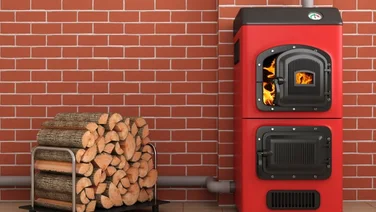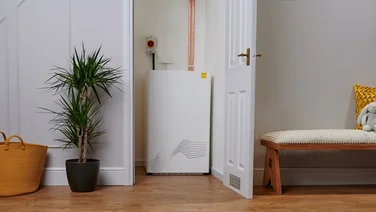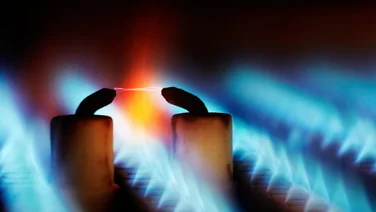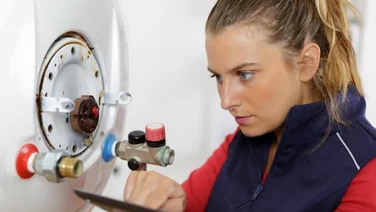We receive a small fee from trusted installers when you request a quote through our site. This helps us keep our content independent, well-researched and up to date – Learn more
- What’s on this page?
- What is an electric boiler?
- How does an electric boiler work?
- Types of electric boiler
- What size electric boiler do you need?
- How much electricity does an electric boiler use?
- How much does an electric boiler cost?
- Are there any grants for electric boilers?
- Can you replace an immersion heater with an electric boiler?
- Summary
The UK government is working towards its goal of banning gas boilers in new builds from 2025 onwards, which means a lot of people will soon be looking for alternative ways to heat their homes (check out the price of a new boiler).
Amongst other contenders, electric boilers could become a popular choice in the coming years. Unlike heat pumps and infrared panels, electric boilers work pretty much in the same way as regular gas ones – they’re just powered differently.
Considering ditching your old boiler for an electric one? Read on to find out everything you need to know about this heating system. Alternatively, if you’re ready to take the plunge, fill in this form to find out how much a new electric boiler will cost you.

What’s on this page?
What is an electric boiler?
Electric boilers are pretty self explanatory – they work in a similar way to traditional gas boilers, but instead of running on gas, they use electricity to heat water. This means they produce fewer carbon emissions than gas and oil boilers, especially if they’re paired with solar panels.
Generally, electric boilers have an efficiency rating of 99–100%, compared to 92–93% in gas boilers.
The boiler itself can come in a variety of shapes and styles, making it suitable for a variety of properties. It’s particularly useful for homes that have limited access to mains gas supply, such as listed buildings.
Read about new boiler costs here for all you’ll need on what you might spend on one.
How does an electric boiler work?
Similar to a traditional gas combi boiler, electric boilers source cold water from the mains water supply. The boiler then heats this water by using electricity from the mains electricity supply, which powers the heating element within the boiler, each time you need hot water for your central heating or hot taps.
As the cold water passes over the metal heating element, heat is transferred, resulting in hot water that can either be used around the house or stored for later use.
Bear in mind that the exact process varies, depending on the type of electric boiler you go for.
Types of electric boiler
Electric combi boilers
An electric combi boiler combines water heating and central heating within one small unit, meaning homeowners don’t need to have a bulky water storage tank – ideal for smaller properties.
Whenever you turn the hot water tap or pop the heating on, cold water is sourced from the mains, goes through the combi, and gets warmed by the heat exchanger.
This type of electric boiler heats up water when you need it, which is great for both the environment and your wallet, but it means it might take a few seconds to warm up.
Electric system boilers
Unlike combi boilers, electric system boilers have a water tank to star water, like a traditional boiler. A coil inside the cylinder of the electric system boiler heats the water, and transfers it to the taps and central heating.
By using a separate cylinder for storing water, system boilers are able to provide a constant supply of hot water throughout the home. This is the primary reason why system boilers are commonly found in larger homes with greater demands for heating and hot water.
Dry core storage boilers
This type of electric boiler utilises electricity during off-peak hours, which is much more affordable for users. It does this by storing heat in a dry material, such as bricks, which can then be released at times when electricity prices are higher, saving homeowners money on bills.
Although they’re similar to regular storage boilers, dry core storage boilers are much more versatile, since the heat is released into the water only when it’s needed.
Heat-only boilers
Heat-only boilers, also known as conventional boilers, work by heating water and distributing it throughout a home using motorised valves, pumps, and tanks.
A cold water tank – usually stored in the loft – takes water from the mains and feeds it into a hot water cylinder. The boiler then heats the hot water cylinder, and supplies it to taps and central heating.
These boilers are best suited for larger homes with greater hot water demand because they store hot water for when you need it, rather than heating it ‘on demand’.
This heating system is very similar to a system boiler, but will a few minor tweaks. According to Valliant, the main difference is that heat-only boilers maintain pressure using a feed and expansion tank, whereas system boilers use a pressurised heating circuit topped up by mains water.

What size electric boiler do you need?
The size of the electric boiler you’ll need will depend on a range of factors, including the size of your property, the number of people living in the building, and how frequently you need hot water.
Electric boiler size is based on the energy output (kilowatts) rather than physical size – the higher the kilowatt (kW) rating, the more taps and radiators it can supply.
According to boiler manufacturer Viessmann, as a basic rule, you should add 1.5 kW for every radiator in your home. So if you have six radiators, you’ll need a 9 kW electric boiler. However, this rule will vary depending on how high your ceilings are, whether you have single or double glazing, and how effective your insulation is.
How much electricity does an electric boiler use?
Electric boilers tend to have a much lower kW power output than gas or oil boilers. However, the exact amount of electricity your boiler gets through will depend on the type of boiler and how much you use it.
For context, the average three-bedroom house will get through 12,366 kWh per year powering an electric combi boiler.
How much does an electric boiler cost?
Electric boiler costs vary, depending on the model and manufacturer. On average, you can expect to pay roughly £2,325 for an electric boiler, which includes installation costs.
It’s also important to bear in mind that electric boilers are much more expensive to run than gas and oil boilers. This is because electricity is 3-4 times more expensive than gas per kilowatt hour (kWh).
In fact, we worked out that the cheapest way to heat your home is with a gas boiler, which will cost you £12,553 over 10 years (for a three-bedroom house). An electric boiler, on the other hand, will cost £20,522 over a decade – about £7,969 more than a gas boiler.
Want to pear your electric boiler with solar panels? You can learn more about this in our helpful guide: Can Solar Panels Heat A House In The UK?
Are there any grants for electric boilers?
There aren’t any government grants that are targeted specifically at electric boilers, but some people might be able to upgrade their current boiler to an electric one through the ECO4 scheme.
However, not everyone will be able to apply for this grant, since it’s aimed at low-income households in the UK.
You could be eligible for the ECO scheme if you receive any of the following benefits:
- Income-based Jobseekers Allowance (JSA)
- Income-related Employment & Support Allowance (ESA)
- Income Support (IS)
- Pension Credit Guarantee
- Credit Working Tax Credit (WTC)
- Child Tax Credits (CTC)
- Universal Credit (UC)
- Housing Benefit
- Pension Credit Savings Credit
The new phase of the grant also supports inefficient social housing and private rented housing (if the landlord permits it).
Can you replace an immersion heater with an electric boiler?
Since immersion heaters and electric boilers both run on electricity, replacing one with the other should be a relatively quick job. Although, this will depend on how easy it is to access the unit, and whether there are any installation issues.
Generally, replacing an immersion heater with an electric boiler can take anywhere between two hours up to half a day. However, bear in mind that you might need additional work carried out by an electrician if there’s an electrical fault affecting the unit.
Summary
Electric boilers have their fair share of pros and cons. Although they’re better for the environment than gas boilers and have a higher efficiency rating, they’re also much more expensive to run – costing more than £7,969 more to run than gas boilers over ten years, to be exact.
However, as we get close to the government banning gas boilers, electric boilers will become more appealing to people around the UK.
If you think your home would be suitable for an electric boiler, you’ll need to find out how much it’ll cost you before taking the plunge. Luckily we can speed up that process.
You can receive bespoke electric boiler quotes by popping a few details in this short form. Once we’ve received your details, we’ll pass them on to our suppliers, who’ll get in touch with free quotes.








